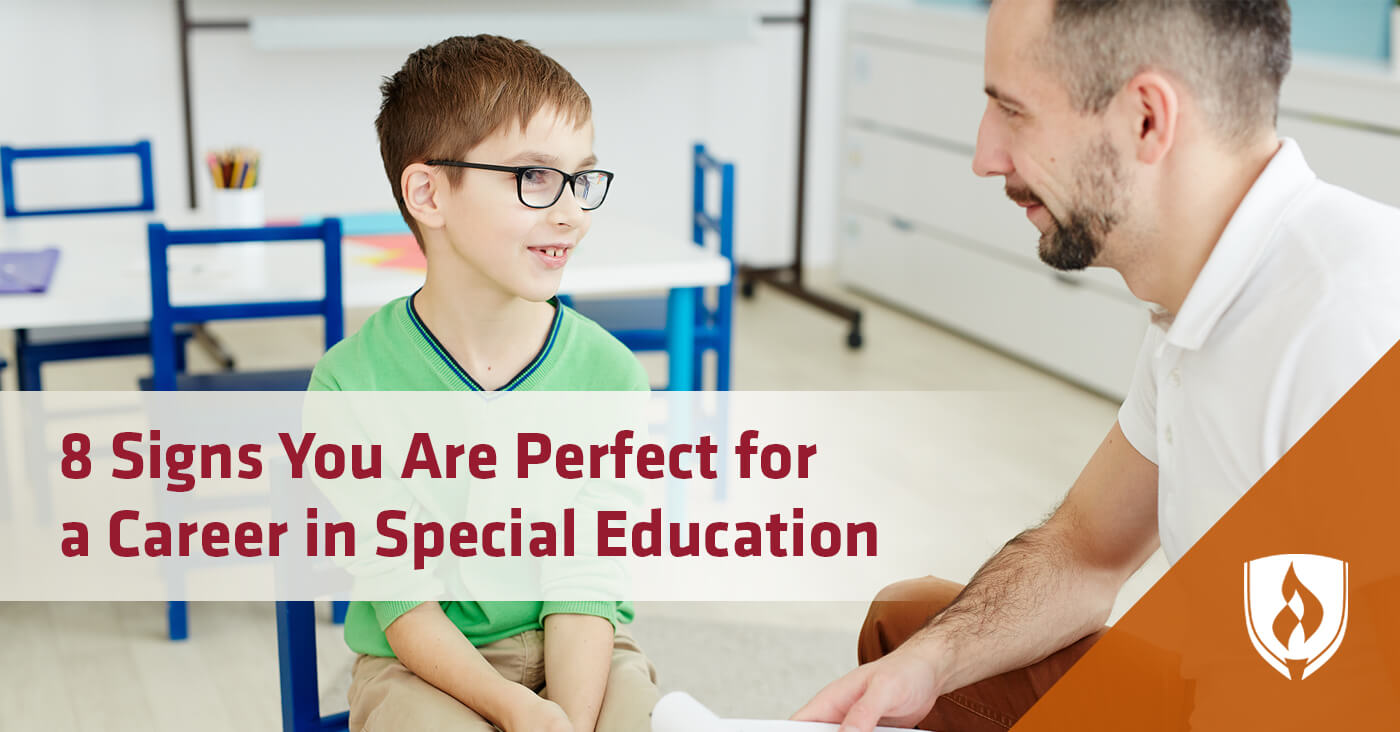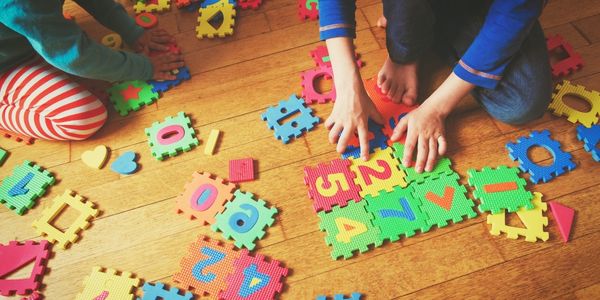
Working with children is both a rewarding and challenging responsibility. Educators draw from their own wealth of academic and life experiences to cultivate both intellectual and emotional growth in their students.
Some of these students fall into the category of special education—requiring teachers who can adapt the general curriculum to meet individual needs. These specialized teachers must demonstrate patience and flexibility to ensure that their students can learn and thrive with the rest of the class.
“Special education is a wonderful field to work in,” says Laura Landkamer, Early Childhood Education instructor at Rasmussen College and special education teacher. “As with any job, it is filled with daily joys and challenges.”
Because of the unique challenges, some people are more suited to working in special education than others. If you’re interested in teaching, you can benefit from doing some research ahead of time to make sure you know what to expect when they stand in front of their first class. Here are some signs that you would make a candidate for a career in special education.
Signs you’d excel in a special education career
Are you cut out for a career in special education? Find out if you possess any of these important traits.
1. You’re patient
How do you react when someone doesn’t understand what you are trying to say? Do you raise your voice and get frustrated, or do you try a different approach? All teachers need patience to work with their students, but in special education, this trait is even more critical. Special education teachers work with students who have a diverse range of abilities.
“Students with special needs often develop skills a slower rate and require educators who are willing to be patient while they work on acquiring new skills,” Landkamer says. She goes on to explain that they may need to practice skills much more than their peers.
Patience is also important when students are upset. “When working with students who may have significant or challenging behaviors, the ability to remain calm and kind is essential,” Landkamer says.
2. You’ve had varied life experiences
Maybe you grew up in a nontraditional family. Or perhaps you’ve been immersed in so many different environment and cultures in your life that you understand how unique and different each person really is. To special education advocate Johnna Ithier, a broad perspective on people and families is a high priority in special education.
“Special education teachers need to be non-judgmental and understanding with varied life experience that may allow them to have a different or less-mainstream view of families and complications,” Ithier explains. Your diverse background can serve as an asset when working with a special education population.
3. You have a flexible approach to teaching
You know there is more than one way to approach a problem. Where some see a direct way to get from A to B, you see scenic routes, detours and shortcuts that might help a student cover the necessary ground.
Many people can thrive as teachers if their natural mode of teaching is effective for their listeners. But special education teachers must take it a step further.
“Flexibility is an important personality trait for a special education teacher to have,” Landkamer says. “Teachers must work to reach students with a variety of needs and learning styles.”
Special education students may need to try multiple approaches to understand the material or master a skill. Sometimes mere repetition isn’t going to cut it, so you’ll need to experiment with varying your approach.
4. You’re dedicated
Are you able to find reasons for motivation in the work you undertake? Dedication definitely doesn’t look the same on everyone. For some, it might look like working long hours to reach a goal. For others, it might be a continual persistence over many years, something you come back to again and again to get one step closer. However it manifests, dedication means you are committed to getting where you want to go.
Landkamer says special education teachers need to be qualified, knowledgeable, dedicated and kind. It takes serious training to be prepared for the career, and teachers will also need to continue learning and adapting on the job. They need to adjust to their unique students every time.
“Special education teachers are tolerant of wide ranges of learning styles and work to find ways to maximize student success by using these learning styles,” Landkamer explains. “They tend to live by this unwritten rule: Fairness is not sameness.”
5. You can handle things not always being orderly
Being organized is definitely a useful skill in education. But many highly-organized people find it difficult to work in a disorganized environment. In special education, however, your standards of order need to come second to the needs of your students.
“For example,” Landkamer offers, “In most classrooms, students are expected to sit still. For some students, this is simply not possible.”
Landkamer says you’ll need a high tolerance for disruptions and a willingness to accept that sometimes students will need to move, wiggle or even stand to make it through a lesson.
6. You aren’t afraid of some paperwork
You don’t have to love paperwork—who does?—but if documentation and regular correspondence doesn’t get under your skin, you’ll have a much better time as a special education teacher.
Working in this environment means you will be faced with more documentation than the average teacher. Special education teachers will spend a considerable amount of time completing paperwork to comply with Individualized Education Programs—which helps monitor student progress based upon their capabilities.
“In special education, there is a lot of reporting,” Landkamer says.
7. You are empathetic and emotionally tough
It can be hard to have possess both of these attributes. Empathetic people can feel the pain of others as though it were their own pain; an understanding and compassion that is very important in a special education teacher, according to Ithier.
Yet at the same time, special education teachers need to be able to handle hard emotional situations—even regularly.
“Can you be kicked at, hair pulled or even spat on by students with students with severe disabilities?” Ithier asks.
Ithier explains that special education teachers see painful realities and need to be able to detach at times. Teachers typically want to do all they can to assist their students, but finding the balance between helper and authority figure is imperative.
8. You are an advocate
Do your friends know when you are passionate about something? Do you find yourself bringing it up at parties, family gatherings … even the checkout counter at the grocery store? That kind of enthusiasm is important to help fuel a career in special education.
Historically, special needs education has helped students who were overlooked by mainstream society. Only in the last few decades have we made progress in ensuring that people with varying levels of disability are accommodated in education. But there is still significant need for support and reform in the disabled community. Teachers must be among the strongest advocates for special needs programs and ending ableist attitudes—educating the general public about the reality and success of individualized education.
This support ties in with the larger battles waged in defense of public education every day. A kindness and sincere belief that all students can and do learn and deserve the best access to education we can provide is among those battles.
Do you fit the job description?
If these characteristics resonated with you, you might be naturally inclined for a career in special education. Landkamer advises gaining some exposure to different demographics or abilities to get a more tangible grasp of what the career entails.
“I would suggest those thinking of joining this field volunteer for programs like Special Olympics,” Landkamer says. “This will provide them a snapshot of what it is like to work people with a wide range of abilities.”
When it comes to special education, there is always plenty to learn. Hands-on experience is an excellent way to begin that process. A little research can go a long way as well. Continue in your research with our article, “Things You Need to Know Before Working with Special Needs Students.” and "What is Ableism? Teachers Share 8 Things They Wish the World Understood".
*Graduates of Early Childhood Education programs at Rasmussen College are not eligible for licensure as a teacher in an elementary or secondary school. A Bachelor’s degree and a state teaching license are typically required to work as a teacher in public and private school settings.




